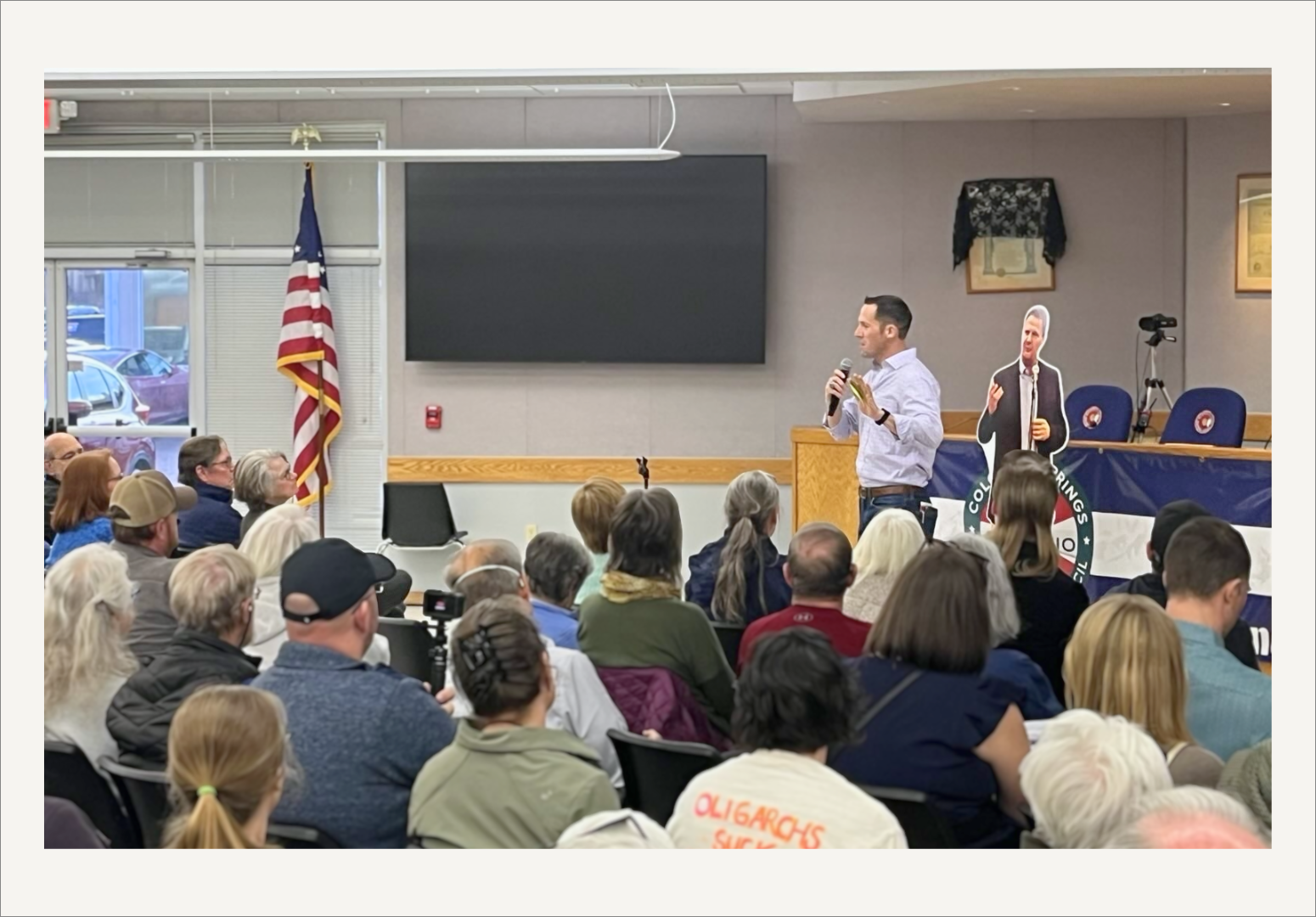
Issues
Joe, a father of two, is committed to ensuring that his community thrives for current and future generations.
His leadership experience in the defense, technology, and nonprofit sectors has prepared him to provide the effective representation El Paso County deserves.
DIVE DEEP into Joe’s positions on…
Health care
Health care has been a lifelong hurdle for Joe. As a child, he witnessed his mother’s battle with multiple sclerosis and experienced firsthand the many challenges families face when caring for loved ones. During his military service, his platoon suffered an unusually high casualty rate, but even after returning home, he lost more soldiers to suicide than he did in combat. These experiences make him a fierce advocate for expanded access to care–he believes that one’s financial status should never determine the quality of the healthcare they receive.
Accessible and Affordable Health Access
Expand access and affordability: Reduce premiums and out-of-pocket expenses, broaden telehealth options, and address provider shortages, particularly in rural areas and urban healthcare deserts where distance from level-one care and hospital closures put families at risk.
Lower prescription drug costs: Advocate for policies so Coloradans can access life-saving medication, including combating price gouging, reducing out-of-pocket drug costs, negotiating federal program prices (including a $35 insulin cap), and encouraging state and local governments to implement their own solutions.
Improve efficiency and quality of care: Promote value-based care that prioritizes patient outcomes over service volume, and blend public and private approaches to enhance accessibility, quality, transparency, and affordability.
Protect reproductive health access: Codify the right to choose into law, guarantee access to contraception and abortion care by fully funding Title X and Medicaid family planning services, and safeguard reproductive health data privacy.
Medicare and Medicaid
Protect coverage: Safeguard access to Medicare, Medicaid, and the Children's Health Insurance Program (CHIP) so Coloradans of all ages can get the care they need without gaps.
Lower costs: Ensure these programs continue to reduce out-of-pocket expenses for seniors, families, and low-income individuals, including negotiating more affordable prescription drug pricing and expanded access to preventive services.
Modernize and strengthen services: Support improvements that expand access to quality care, maintaining program solvency for future generations. This effort includes expanding telehealth access, long-term care options, and expanded oral health, hearing, and vision services.
Mental Health
Expand access to comprehensive care: Treat mental health as an essential part of healthcare for all. Ensure that every American has timely access to therapy, counseling, and crisis intervention, and remove financial barriers so that everyone can receive the care they need.
Destigmatize mental health: Launch initiatives that normalize seeking help, train communities to recognize warning signs, and foster a culture where asking for support is seen as a strength. Invest in evidence-based research and make routine mental health screenings standard in schools, workplaces, and clinics.
Strengthen community support systems: Expand proven programs, such as the Next Chapter initiative, along with “buddy checks” and peer-to-peer networks, to build strong social connections and ensure no one faces mental health challenges alone.
Affordability
Wages have not kept pace with the rising cost of living, forcing many Colorado families to work multiple jobs or live paycheck to paycheck. While Trump is pushing forth trade tariffs and tax cuts to the ultra-wealthy and major corporations, Congress must put families first. Rising prices and housing costs are placing additional pressure on seniors, working families, and individuals, leading to financial stress and limiting opportunity. Joe is committed to reducing the cost of living, expanding access to affordable housing, and removing barriers that prevent communities from thriving. Joe will focus on practical, bipartisan solutions to protect jobs, strengthen the middle class, and ensure that Colorado families have the resources and stability they need to get ahead.
Lower Everyday Costs
Eliminate harmful tariffs: Remove federal tariffs that raise the cost of groceries, school supplies, and household goods, protecting Colorado consumers and small businesses.
Crack down on price gouging: Hold corporations accountable for unfair practices in prescription drugs, food, and essential goods – especially during critical emergencies.
Support working families: Promote policies that address America's childcare crisis so families don't have to choose between childcare and having a job. Invest in early learning facilities and early childhood educators.
Strengthen the Middle Class
Invest in long-term economic security strategies: Promote policies that reduce inflation, lower the cost of living, and protect families from unexpected financial crises. Expand programs like the Child Tax Credit, which helped millions of American families cover basic needs during economic uncertainty.
Expand opportunity through targeted programs: Build on models like the GI Bill to help Coloradans access education, homeownership, and career pathways that strengthen financial security.
Protect consumers from market volatility: Support programs that limit the impact of rising costs caused by corporate practices and external economic shocks. Strengthen antitrust laws and expand emergency relief programs to help families plan for the future with confidence.
Affordable Housing and Homeownership
Expand rental assistance and affordable housing: Champion programs that increase funding while partnering with local authorities to revitalize neighborhoods and create affordable housing. Support programs that provide tax credits for renters who spend more than 30% of their income on housing.
Support first-time homeowners: Address rising property insurance costs and support programs that offer grants, such as the Bipartisan American Homeownership Opportunity Act of 2025 for first-time buyers.
Promote sustainable housing policy: Support updated housing infrastructure to help preserve existing housing stock, such as HUD’s Green and Resilient Retrofit Program, which provides grants to improve energy or water efficiency, enhance indoor air quality, and address climate change.
Veterans & Military Families
Joe has dedicated his post-military career to advocating for Veterans and their families. His work is nationally recognized for helping Veterans access resources for small business ownership, homelessness, mental health, homeownership, and health care. Additionally, he is a local nonprofit leader who empowers veterans, transitioning service members, and military spouses through entrepreneurship. Joe will continue building on his service to create a holistic system that recognizes and honors the sacrifices of those who have served while ensuring their well-being and successful integration into civilian life. As a Representative, he will advocate for a “no wrong door” approach that allows Veterans and their families to seamlessly access healthcare, education, employment, and social services.
Support During and After Transition
Barrier reduction: Streamline the navigation of benefits and services so every service member, Veteran, and military family can easily access the resources they have earned.
Comprehensive mental health resources: Prioritize mental health at every stage of care and transition by expanding access, reducing stigma, and investing in high-quality, evidence-based services.
Holistic support network: Strengthen programs that help Veterans reenter the workforce through job search assistance, networking, and skill development, and expand initiatives that build social connections and community integration.
Strengthen VA and Health Services
Timely access to care: Reduce wait times, expand staffing, and ensure every Veteran can access high-quality, comprehensive VA services when they need them.
Expanded treatment: Deliver care that honors Veterans’ unique experiences and sacrifices, addressing service-related health risks and combat trauma, and expand telehealth and mental health services.
Program modernization: Update VA programs and facility infrastructure to meet the evolving needs of Veterans and their families.
Expand Opportunities and Stability
Education support: Strengthen GI Bill benefits to cover a broader range of educational and vocational programs and provide comprehensive resources that help Veterans transition smoothly into civilian careers.
Entrepreneurship programs: Expand mentorship and training programs for Veteran-owned businesses, providing the guidance, resources, and networks they need to succeed and grow.
Combat homelessness and economic insecurity: Partner with community organizations to ensure Veterans have access to affordable housing, stable income, and comprehensive health care—especially mental health services—so they can build secure, sustainable lives.
Restoring Trust in Government
Joe has spent his nonprofit career stretching every dollar to deliver results, and he believes our government must meet that same standard. Joe will uphold the Constitution, enforce accountability, and ensure that the government works for the people it serves—efficiently, transparently, and with integrity. Our elected officials should be in service for people, not for profit. The influence of dark money and corporate interests in our elections undermines our democracy, and voters deserve complete transparency about their Representative’s potential conflicts of interest.
Campaign Finance Reform
Put families first, not corporations: Support campaign finance reform initiatives to get dark money out of politics. Reduce the influence of wealthy donors and special interest groups, ensuring elected officials prioritize the needs of everyday Americans.
Overturn Citizens United: Reverse the decision that opened the door to unlimited corporate spending in elections, establish limits on corporate influence, and expand public campaign financing to strengthen democratic participation.
Ban the revolving door of lobbyists: Enact the Lifetime Lobbying Ban Act to prohibit former members of Congress, senior executive officials, and high-ranking service members from lobbying foreign or domestic special interests, restoring the trust that public service is about the people, not future profit.
Transparency and Ethical Standards
Enforce ethical accountability: Strengthen the STOCK Act, TRUST in Congress Act, and similar measures to prevent members of Congress and their families from using nonpublic information and government resources for personal financial gain, with clear consequences for violations.
Stop foreign payoffs: Support legislation that bars elected officials and their close family members from investing in or receiving compensation from foreign businesses while in office, ensuring Congress makes decisions in America’s interest.
End corruption in public office: Back laws like the NO CORRUPTION Act to strip members of Congress convicted of felonies or offenses tied to their official duties of their pension benefits and other privileges, making abuse of power carry real consequences.
Fiscal Responsibility
Manage the federal budget: Prioritize smart spending, eliminate waste, and reduce the national debt, while supporting programs that grow the economy, create local jobs, and strengthen communities across the state.
Preserve the federal workforce and critical investments: Protect the capacity of federal agencies to deliver essential services, including health care, education, national security infrastructure, and energy programs that sustain rural and urban communities alike.
Ensure effective, transparent government operations: Ensure taxpayer dollars fund programs that deliver measurable results for Coloradans, maintain accountability, and support priorities such as land stewardship, climate resilience, and local economic development.
Workers & Unions
Joe has seen how the quality of life for working people has declined and knows that protecting their rights and opportunities is essential. Unions play a vital role in this by protecting workers from exploitation, unsafe conditions, and unfair practices while providing training, career growth, and financial stability, opportunities that Colorado has neglected as a right-to-work state. Joe will stand with unions, listen to workers, and take their fight to Washington. He values the dignity of hard work and believes every person should earn a wage that reflects their skill and effort. Joe is committed to rebuilding Colorado’s middle class and restoring the respect, support, and opportunities working people deserve.
Protect and Expand Collective Bargaining Rights
Strengthen organizing rights: Modernize labor laws to make it easier for workers to organize and negotiate for better wages, benefits, and working conditions.
Support essential workers: Empower nurses, teachers, law enforcement, firefighters, and other frontline workers to secure fair pay, adequate staffing, and safe working environments through strong union representation.
Improve retention and stability: Promote collective bargaining as a tool that boosts workforce retention, reduces turnover, and creates more stable and competitive workplaces.
Strengthen America’s Workforce and Middle-Class Jobs
Create good-paying American jobs: Prioritize investment in domestic industries and direct federal subsidies to American producers instead of foreign entities to drive long-term economic growth.
Invest in workforce development: Expand partnerships among unions, employers, and educational institutions to build training pipelines, apprenticeship programs, and upskilling initiatives that prepare workers for a rapidly changing economy.
Support innovation and emerging technologies: Equip workers and small business owners through transition to thrive as AI and new technologies reshape industries.
Raise Labor Standards and Protect Worker Safety
Establish fair federal labor standards: Support collective bargaining. Champion laws that raise the minimum wage, require paid family leave, and enforce OSHA, anti-discrimination, and child labor laws.
Prioritize workplace safety: Modernize safety regulations and oversight to address new risks created by emerging technologies, automation, and AI-driven workplaces.
Promote responsible economic growth: Ensure rising productivity from new technologies translates into better conditions for workers—not lower standards or weakened protections.
Environmental Protection & Energy
Joe is the type of person who will wake up early to top the Manitou Incline by sunrise or bike up Pikes Peak for fun. He spends as much time as he can on the slopes or camping in the backcountry with his sons. As an avid outdoorsman, Joe believes preserving our environment and addressing climate change requires immediate action. He considers the economic incentive to address climate change to be as strong as the moral one. Joe will champion climate policy that supports American jobs, reduces energy costs, and diversifies and strengthens America’s energy future. By taking decisive action now, we can ensure a livable planet for our children and grandchildren while protecting Colorado’s communities and natural resources.
Combat Wildfires and Protect Natural Resources
Support and strengthen wildland firefighters: Firefighters protect our communities from severe fires like Waldo Canyon and Black Forest. As a founding board member of Conversa Corps, Joe promotes collaboration among first responders. He will back initiatives to improve pay, benefits, mental health support, and workforce housing, ensuring firefighters are prepared, supported, and retained.
Invest in proactive wildfire mitigation: Rising insurance costs and insurers leaving fire-prone regions highlight the urgent need for these measures. Joe will support bipartisan legislation, such as the Cross‑Boundary Wildfire Solutions Act and the Wildfire Coordination Act, that fund research, strengthen mitigation strategies, and improve coordination among federal, state, and tribal agencies.
Rebuild and protect lands by restoring agency capacity: Oppose staffing cuts at the National Park Service, Bureau of Land Management, and Forest Service; support rehiring skilled land management staff; and ensure public lands remain resilient for recreation, habitat protection, and wildfire prevention.
Transition to Clean and Renewable Energy
Invest in clean energy research and innovation: Fund Colorado institutions, such as the National Renewable Energy Laboratory and Colorado State University, to develop next‑generation clean energy technologies, decarbonization projects, and water-efficient energy solutions. By transitioning to cleaner energy sources, we can reduce air pollution and greenhouse gas emissions while fostering economic growth and job creation.
Expand clean energy infrastructure and EV adoption: Grow Colorado’s wind, solar, and hydroelectric sectors. Leverage the Bipartisan Infrastructure Law funds to reduce emissions, create jobs, and safeguard water resources. Expand electric vehicle and hydrogen fueling networks, especially in rural and underserved areas.
Strengthen climate resilience through smart energy and land investments: Use federal climate funding to support wildfire prevention, watershed restoration, and forest health, while regulating high water-use industries like AI to preserve Colorado’s water supply for communities, agriculture, and ecosystems.
Preserve Colorado’s Parks and Public Lands
Restore federal land management staffing: Oppose staffing cuts at the Forest Service and National Park Service to ensure sufficient personnel are available to manage forests, wetlands, rivers, and other critical ecosystems.
Strengthen the natural environment and wildfire resilience: Fund programs that support controlled burns, reforestation, and habitat restoration. Support initiatives that work to reduce wildfire risk, protect biodiversity, and preserve Colorado’s natural resources for future generations.
Support sustainable public lands for communities and recreation: Protect vital resources like the Colorado River so it remains healthy and resilient amid climate change and growing water pressures. Maintain and improve public lands so local economies and tourism can continue to thrive and enjoy the resources.






